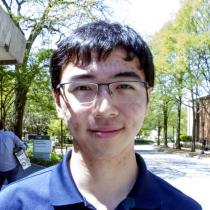
Scott Yue Guan
What is your next adventure?
I will be staying at Georgia Tech to study under Prof. [Panagiotis] Tsiotras. We'll be working on the more theoretical end of the spectrum in autonomy -- multi-agent game theory. I'm still reading papers about it right now.
What about your next adventure are you most looking forward to?
I'm excited because I'll have more free time to do research. I'll have the chance to synthesize what I've been studying, to push the boundaries, even. As an undergraduate, I've been a math minor, and I've seen some beautiful theorems. Now I'll actually have a chance to develop some interesting algorithms.
Did you have any previous co-op, internship, or research experience in this area?
You are always trying to figure out where you will land on the spectrum between theoretical and experimental. First, I worked in the [Ben T. Zinn] combustion lab, where we tested a new generation combustion engine.My second year, I finally realized what I wanted to do. I worked with Dr. Clarke, doing CFD for an air speed instrumentation fault detection project. During one summer I did a research internship at the Technical University of Munich where I worked on CFD simulation of geo axial helicopter blades. It was a really interesting work environment, totally different. It was hard for me to figure out what they were expecting. Sometimes, I was super-independent because I didn't want to bother them with questions that would waste their time. Then there were times where I would have wasted five hours on the wrong task if I hadn't asked. I figured it out, and it was a good lesson.
This past year, I worked with Prof. Saleh looking at high thru-put satellites. New high thru-put satellites are optimized to provide data services and uplinks that address individual customized needs. I worked with him on the intro to a paper that looked at their capabilities and potential. We made suggestions. We also worked on a more theoretical cost model for the satellites.
How did your educational experience at Georgia Tech help you to achieve your goal?
The professors. They are world-class. And they are really committed to teaching. Dr. Saleh was all always well-prepared and ready to motivate you to do your best. He was the best-ever mentor. Dr. Clarke was always there for advice. At one point I told him that my computer couldn't handle CFD and he basically bought me a computer with the right CPU and cards. I thought this was all normal until I went to Munich. It wasn't. Georgia Tech has such great software packages available to its students. Munich did not. So, when I was working over there, I just logged onto my Georgia Tech account and used our software.
What advice would you give to an underclassman who would like to follow the same path?
That's a very philosophical question. Any kind of advice I give now you'll eventually regret. If I tell you to stick to your research above all else, and that's what you do, 50 years later you might regret not having more fun. I'd say the best advice is to seek balance, but know that you might not succeed in that. For myself, personally, I prefer to regret -- not enjoy -- my college years, in terms of the fun that I might miss. If you work hard for many years to develop a body of research, your hard work gave you the foundation for having something to regret. It gave you a career, something to support you. At Tech, to do your homework, you have to sacrifice free time and the things you might do with it, like hiking or sports. For me, I didn't have the time to play clarinet because I chose to do research. It's a price that I decided to pay. Is that right? Who knows? Ultimately, after I finish my degrees, I will probably go back to to industry because my goal has always been to be an engineer, to apply my knowledge to physical systems. And industry feels like it might be a little bit of a break because you just work eight to 10 hours a day. At Tech, there's always another equation.